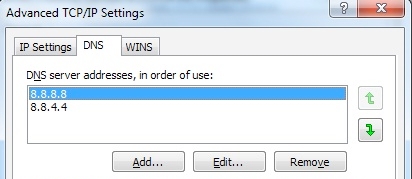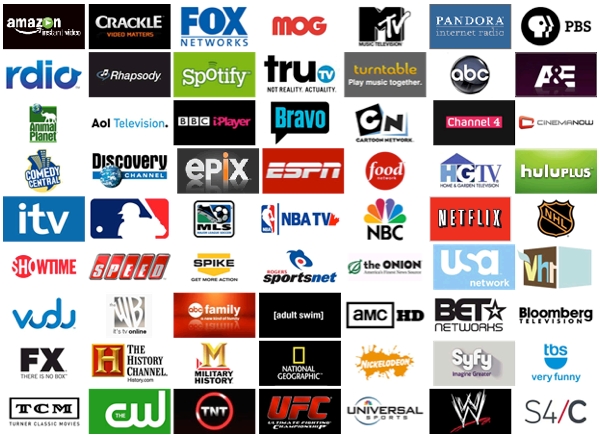#3 DNS redirector, Subscribing to paid services
Alternative #3: DNS redirector
Although VPNs make up for the best region-cracking solution they aren't without their drawbacks. For one thing, they require a middle man, which can result in speed loss for those with super fast connections. They are also easy to setup on a computer and some mobile devices but not so much if you want to use it to route Internet traffic from any device in your house – Xbox 360, Apple TV, and whatnot. It's not impossible but you'll need to hack your router with custom firmware or buy a preconfigured one to run your network with.
If you don't want to go through all that hassle then DNS redirectors pose an interesting alternative. Basically you'll be able watch locked content on multiple devices – even simultaneously – simply by changing the DNS server settings on your computer, console, router, or a number of supported devices.

DNS settings in Windows 7 - you'll need to configure these on each device/player you want to use
It's not entirely clear to me how it works (the explanations I've read from these services include the words "magic" and "secret sauce") but in a nutshell they create a network tunnel from your location to a remote server usually in the US or UK, so it appears that requests actually originate from those countries.
It's one of the easiest solutions I've come across and it works. The main disadvantage is that it only works for a set of supported services and players. The good news is that the list of supported services and players is usually pretty extensive and new ones are added if there's enough demand for them.

For a free alternative try Tunlr. It supports close to 30 services, including most of the popular ones like Netflix, Hulu, Pandora, and BBC iPlayer. Supported players include Mac and Windows computers, as well as the Apple TV, iPhone, iPad, Android devices, Xbox 360 and PlayStation 3 consoles. Their service will remain free, they don't log your internet activities, and though it works well they're not aiming to provide a professional 24/7 service. "Tunlr is up when it's up, and is down when it's down," reads their FAQ.
For paid services, Unblock-us and UnoDNS are popular choices, and both offer free trials. I've only tried the latter which advertises faster than VPN speeds, no bandwidth caps, 256-bit encryption, among other things. From my experience it does work quite fast and it has a huge list of supported 'channels' offered in a premium ($4.95/mo.) or gold ($7.95/mo.) plan. They support many different devices and work on a pay-as-you-go basis.
Device specific instructions for each service are available on their respective sites: Tunlr, Unblock-us, UnoDNS.
Subscribing to paid, region-locked streaming services
Any of the alternatives we've presented you with will let you get around region blocks and start streaming content regardless of your geographic location. It should be noted that none of these will enable free access to paid content, however. Some services like Hulu and Spotify offer free, ad-supported tiers in addition to a premium option while others strictly require a paid subscription in order to use them.
Unfortunately, most – if not all – for-pay services also require that the credit card you are using to subscribe is issued in the country you're spoofing. So even if you want to pay the monthly subscription for Hulu Plus, for example, and you've gone through the extra effort and expense of setting up a VPN account, you still won't be able to give them your hard earned money. You need to jump through a few more hoops.

A prepaid Entropay virtual card can help you with that. It's like a regular Visa except you charge it upfront using your credit card and can only spend whatever funds you have available at the moment.
Here is what you need to do:
Sign up for an Entropay account and choose the desired currency from the drop down menu in the process (e.g. USD if you need an US-issued card). Under Country, enter your actual country, so that it matches the billing address in file for the card you'll use to fund your Entropay account.
On the next screen fill in the details of the credit card you will use to fund the virtual Visa card. The charge up fee is 4.95% of the total amount and the minimum charge up amount is $20.
That's it! Entropay will generate a virtual prepaid Visa for you to use with the amount funded. You'll get a working card number, expiry date, name, and security code just like a regular Visa. In some cases Entropay may follow up to verify your details by asking for a photo ID and a credit card statement.
So there you go, you can now access region locked services and also pay for a premium subscription with a working Visa. All in all, it will cost you a bit more but your other options are moving to another country or wait it out until content owners decide to join the new millennium and work out international licensing.
It's worth noting that you'll still need to enter a valid country-specific physical address when registering with some services. Usually, any valid address will do, so just look up a commerce or something and use that.
Lastly, please note that, knowing of this loophole, some services have decided to stop accepting Entropay, so do some research before funding your virtual card. Netflix and Hulu Plus are among those sites, but people have reported it's still possible to work around that extra hurdle by signing up for a US Paypal account, linking it up to your Entropay account, and then use Paypal as the payment option. Easy peasy!
Technicians connecting network cable illustration by Shutterstock
